Oct 27, 2022
NEGATIVE ADJECTIVE WORDS USED TO DESCRIBE

NEGATIVE ADJECTIVES
What Are Negative Adjectives?
Negative adjectives are basically descriptive words that we use to describe someone’s character in a bad way.
USES OF NEGATIVE ADJECTIVES
We can use them to describe places or situations that we don’t like.
Places, people, and situations are sometimes very unpleasant. Negative adjectives help people to describe their negative and unflattering opinions about people or situations.
These descriptive words can be used by writers to bring a story to life. It helps the reader understand that a character’s personality is distasteful or to explain how bad a certain situation really is.
Negative adjectives can be used to describe any and everything that is not pleasant. Negative adjectives are usually used as a verbal reaction towards something or someone who has hurt you or made you mad. Words like these are frequently used during an argument. Although they may be used correctly and maybe accurate, they are words meant to insult, not compliment.
Negative Adjectives Examples
Below is a list I have complied of several negative adjectives and their meanings and an example of how they are used in a sentence.
1. Aloof
Meaning: Someone with a very unfriendly manner towards others.
Example: She was aloof about how she made him feel.
2. Hostile
Meaning: angry, violent feelings towards someone
unfriendly; antagonistic.
Example: He was hostile about being fired from his job.
3. Vague
Meaning: unclear meanings or intentions
Example: She was vague in her directions.
4.Callous
Meaning: feeling no sympathy for others
Example: They were so callous towards their boss when his wife died.
5. Nasty
Meaning: Not nice or pleasant to any of the senses
Example: Raymond had a nasty habit of lying and cheating.
6. Cynical
Meaning: Not trusting anyone, believing that all people are bad or dishonest
Example: People who are cynical usually don’t believe in trust or in love.
7. Vain
Meaning: Overwhelming pride in one’s own accomplishments or abilities
Example: She is so vain that she stands in the mirror looking at herself for hours.
8. Self-centered
Meaning: Being too interested in one’s own self.
Example: Rachel is so self-centered that she thinks of no one but herself.
9. Deceitful
Meaning: lying to get one’s way
Example: She is a very deceitful person.
10. Impatient
Meaning: wanting something right now, not wanting to wait
Example: Cody was impatient to get his paycheck.
11. Stubborn
Meaning: refusing to stop doing something, demanding one’s own way
Example: My dog is so stubborn that he absolutely refuses to walk with a leash.
leash - a strap or cord for restraining and guiding a dog or other animal.
12. Defensive
Meaning: protecting one’s self when there is no reason to
Example: He got defensive when confronted about the missing money.
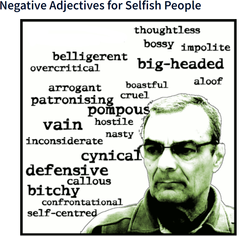
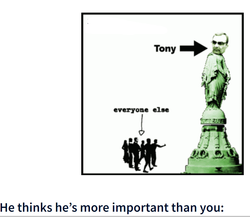
NEGATIVE ADJECTIVES FOR SELFISH PEOPLE
He thinks he’s more important than you:
1. Arrogant — He thinks he’s the best.
2. Big-headed — The same as “arrogant.”
3, Self-centred — The world has to revolve around him!
4,. Vain — He loves looking at himself in the mirror.
5. Boastful — He always talks about how brilliant he is and all the amazing things he does.
6. Pompous — Like “arrogant” but in a way that makes him look foolish, like this guy:
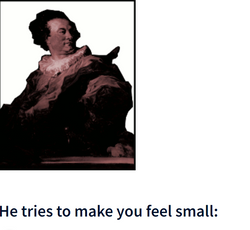
He tries to make you feel small:
1. Callous — He doesn’t care about anyone, especially those who are weaker than him.
2. Cynical — He sees the bad side in everybody’s personality and actions.
3. Overcritical — He exaggerates the negative things you do.
4. Patronizing — Sometimes his words sound kind — but he’s really showing how much more important he is than you.
He doesn’t care how you feel:
1. Aloof — He’s unfriendly, cold and distant.
2. Impolite — He’s rude.
3. Inconsiderate — He does things that hurt or annoy you without thinking about your feelings.
4. Thoughtless — The same as “inconsiderate.”
He’s aggressive:
1. Confrontational — He tries to challenge you, even when it’s not necessary.
2. Defensive — He behaves as if you’re attacking him, even if you aren’t.
3. Hostile — He behaves like your enemy.
4. Belligerent — He’s aggressive and hostile.
5. Bitchy — He makes small, sarcastic comments about you. They seem small, but they’re designed to hurt you.
6. Nasty — He’s not nice.
7. Bossy — He likes telling you what to do — like a boss.
8. Cruel — He actually enjoys seeing other people in pain and sometimes creates that pain.
9. Domineering — He likes to have control over everyone in every situation.
NEGATIVE ADJECTIVE FOR DIFFICULT PEOPLE
You can’t trust her:
1. Deceitful — She pretends to be your friend, then she’ll stab you in the back (do something bad to you after you’ve started trusting her).
2. Dishonest — She’s not honest.
3. Machiavellian — She intelligently uses different people against each other to get what she wants.
4. Sneaky — She does things that you don’t know about that affect you negatively.
5. Untrustworthy — You can’t trust her. She lies!
She hates change:
1. Dogmatic — She has strong beliefs and doesn’t accept any view outside those beliefs.
2. Inflexible — When she’s made plans, NOTHING can change them.
3. Intolerant — She doesn’t like certain types of people and will never accept them. Sometimes this can be extreme, like racism, sexism or homophobia.
4. Narrow-minded — She has a small view of the world and doesn’t accept ideas outside that view.
5. Stubborn — You will never be able to change her opinion on anything.
6. Obstinate — Like “stubborn,” but a little stronger.
7. Pig-headed — Like “obstinate.” But with a pig.
8. Fussy — She likes everything to be a certain way. If there’s a change, she gets very upset or angry.
She’s difficult to work with:
1. Indiscreet — Sometimes you don’t want somebody shouting your bank balance out across a crowded office. Or you don’t want someone to walk in the room with a bottle of whiskey when your Saudi client is visiting. But Amber will do these things.
2. Tactless — It’s like “indiscreet” but with words. It means she sometimes says something stupid that might hurt someone, usually without realizing it.
3. Unpredictable — You don’t know what she’s going to do next!
4. Vague — She doesn’t explain things clearly.
5. Impatient — If she has to wait too long for anything, she gets angry. Maybe she’ll walk away.
6. Unreliable — If she tells you that she’s going to meet you at 7 o’clock, she probably won’t. You can’t trust her to keep her promises.
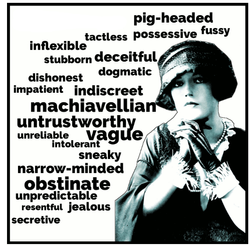
She behaves badly in relationships:
1. Jealous — She hates seeing you with other people.
2. Possessive — She only wants you to spend time with her. You have no other friends now.
3. Resentful — She still gets angry about things that happened a long time ago.
4. Secretive — She regularly keeps secrets from you.
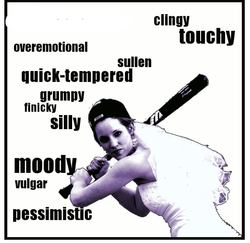
NEAGATIVE ADJECTIVES FOR EMOTIONAL PEOPLE
1. She’s always in a bad mood:
2. Quick-tempered — She gets angry very easily.
3. Grumpy — She’s always in a bad mood and doesn’t want to speak with you.
4. Moody — Her moods are unpredictable. Sometimes she seems fine, and then suddenly she’s in a bad mood.
5. Pessimistic — She always sees the negative side of things.
6. Sullen — Like “grumpy.”
7. Touchy — You can make her angry or upset very easily.
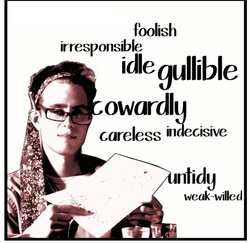
NEGATIVE ADJECTIVES FOR LAZY PEOPLE
He’s lazy:
1. Idle — “Lazy” describes someone who doesn’t want to do anything. “Idle” describes the situation of not doing anything.
3. Careless — He doesn’t care enough about things, so he can often lose or break them.
4. Irresponsible — If you give him a task to do, he will mess it up (do it very badly).
5. Untidy — He doesn’t tidy up and leaves a mess everywhere. He’s probably got some food on his shirt, too.
He’s weak:
1. Cowardly — He’s afraid of everything.
2. Foolish — He doesn’t have the brains to make the right decisions — so he makes bad decisions.
3. Gullible – If you told him that you’d just been invited to Tom Cruise’s space station party on the moon, he’d believe you.
4.Indecisive — He finds it difficult to make decisions — so he often sticks with “no decision.”
5. Weak-willed — You can easily convince him to do what he doesn’t want to do. He’s also probably addicted to something (alcohol, cigarettes, drugs, cheese — something).
By undefined
23 notes ・ 69 views
English
Beginner